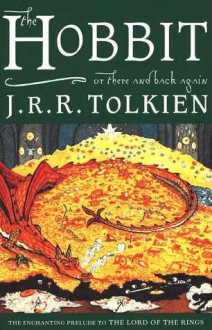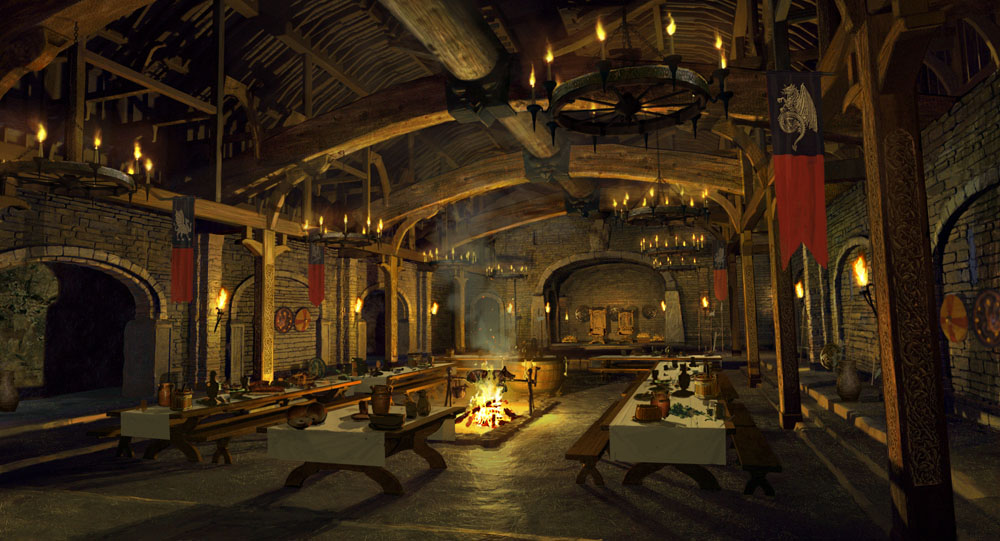
There are few moments in the Tolkien legendarium that are of more far reaching consequence than Chapter 5 of The Hobbit. Titled Riddles in the Dark, it could be subtitled "wherein Bilbo Baggins meets his destiny and changes the course of history for all to come."
There are so many things to think about in this chapter, and I am going to focus on but a few of them.
First, I want to talk about the first time I heard this chapter. My first experience with The Hobbit was as a child, and my mother read the book aloud to me. This is the chapter that I remember most clearly, and not just because Bilbo found a magic ring, but also because I was so charmed by the riddle game. I remember quite clearly being totally out of my depth with the riddles - I couldn't have guessed a single one of them. They stuck with me, though, especially the two riddles about the teeth and the egg, which together, somehow, put me in mind of humpty-dumpty. Even now, when I read the teeth riddle, I mentally picture all of the king's horses and all of the king's men on their white steeds at the top of the hill, trying to put the poor broken egg of a humpty-dumpty back together again. Childhood imagination is a powerful thing that can reach back decades.
Now, as well, let's talk about the finding of the ring - Bilbo reaches out his hand, and there it is, on the floor, just in the place that he has found himself knocked out and shunted aside. Is this coincidence? Is this more of Bilbo's possibly supernaturally helped along luck? In order to talk about this chapter the way that I want to, I am going to have to reach into the future, to the Lord of the Rings, and bring up some of the elements that we see in later books.
But, before I get there, I also want to talk about the history of Chapter 5 because there are actually two of them. There is the Chapter 5 which Tolkien wrote and which was published in the first edition in 1937, which - apparently, because I've never actually had the opportunity to read it - had a very different tone that the current version of the Chapter. In that version, Gollum was friendlier, less dark, and voluntarily bet the ring as a prize in the riddle game. When Tolkien wrote LOTR, years later, he recognized that this behavior of one willingly giving up the ring was entirely inconsistent with the evil and addictive nature of the ring itself, so he rewrote the chapter in later editions.
Tolkien was incredibly clever in the way that he did this - as a scholar of medieval works, he was familiar with the way that a narrative will develop over time (only one example would be the Arthurian legend, which has been told and retold so many times throughout history that there are nearly as many Arthurs as there are individuals who have told his story) and, as well, in the way that the perspective of the tale-teller can alter the truthfulness of a narrative. The Hobbit was from Bilbo's perspective - he is, therefore, our frame narrator. To suggest that Bilbo, essentially, first told a sanitized version of the way he obtained the ring - giving Bilbo an honest claim of right to the thing, was convincing and consistent with human (and Hobbit) nature. We are left with a sense, therefore, that this second version is more truthful than the first, because it is less flattering to Bilbo. And while the essence of his claim to the ring is diminished by the truth of the way that he obtained it, through theft instead of by gift, it is still not so bad as it could be.
All we know of the ring, at this point, is that it is a powerful magical object that allows the wearer to become invisible. The truth about the ring's nature is one that we will not learn until the we get to the Lord of the Rings. Even so, though, there are some things about this chapter that line us up for what is coming, and that I will want to look back at once we arrive at the relevant part of LOTR.
We will find out, later, that up to this point, the transfer of the ring from Gollum to Bilbo is apparently the first time in history that such a transfer has occurred without the ring being taken by force through murder. Bilbo steals the ring, but he does not harm Gollum in the stealing. This turns out to be incredibly important because the ring thrives on domination and what could be more dominant than to murder someone to obtain a prize. Bilbo's soul, such as it is, remains basically unscathed by his taking of the ring - it is not broken or scarred by the fact that he has been compelled to kill to possess the ring.
So that moment, at the end of the chapter, when Bilbo feels pity for Gollum is, quite possibly, the most important moment in all of the books about Middle Earth. It is so simple that it passes, almost unremarked upon:
A sudden understanding, a pity mixed with horror, welled up in Bilbo’s heart: a glimpse of endless unmarked days without light or hope of betterment, hard stone, cold fish, sneaking and whispering. All these thoughts passed in a flash of a second. He trembled. And then quite suddenly in another flash, as if lifted by a new strength and resolve, he leaped.
But it is there, and we are reminded of the innate goodness of Bilbo. The difference between his life - of warmth and light and fellowship and laughter - and that of Gollum doesn't stir in him a sense of superiority, or a feeling that he is somehow better than Gollum and therefore privileged to kill him. It stirs in him empathy and compassion. And it is just that empathy and compassion that allows him to resist the evil of the ring when so many others (perhaps, even, all others) would have immediately fallen to it.
Bilbo Baggins is quite possibly the only individual who could have taken on the ring without trying to master its true power for himself. He had no wish to dominate, and so he treated it like a trinket, and carried it in his pocket for decades without ever once drawing on its power to subjugate. How remarkable this is only becomes clear when we look backwards, at the ring's history, and forwards at the ring's future. Even at this early moment, the War of the Ring is beginning, and the forces opposed to Sauron have achieved a great advantage in the fact that possession has passed to Bilbo Baggins without violence.



 Log in with Facebook
Log in with Facebook 






